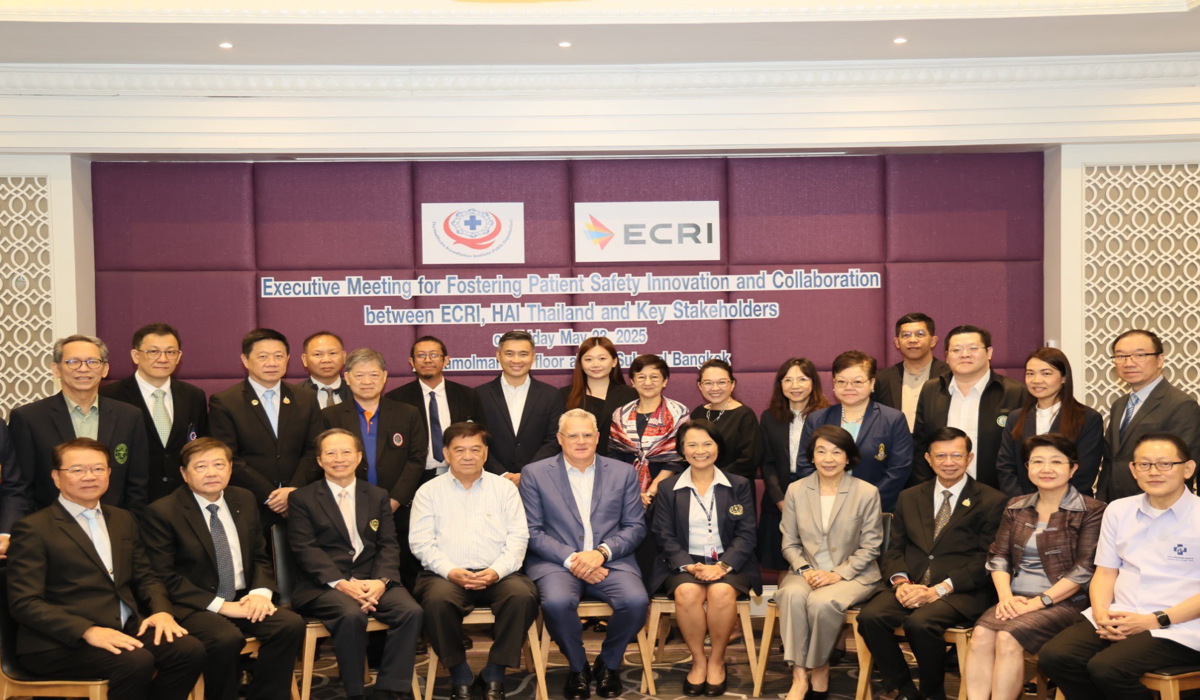ECRI and HAI Thailand Host Executive Meeting to Foster Patient Safety Innovation and Collaboration

On May 23, 2025, Prof. Dr. Prasit Watanapa, Chairman of the Healthcare Accreditation Institute (HAI), welcomed Dr. Marcus Schabacker, President & CEO of the Emergency Care Research Institute (ECRI), via an online platform at the Executive Meeting on Fostering Patient Safety Innovation and Collaboration between ECRI, HAI Thailand, and Key Stakeholders. The event, held at The Sukosol Hotel in Bangkok, brought together 46 participants, including HAI board members, representatives from public and private hospitals accredited under HA quality standards, and multidisciplinary professionals.
Dr. Piyawan Limpanyalert, CEO of HAI, emphasized that the meeting aimed to advance patient safety by integrating global knowledge, innovation, and best practices to strengthen healthcare system safety and quality. The event served as a platform for sharing innovative processes and collaborative strategies in patient safety, risk management, and medical technology, leveraging ECRI’s world-class expertise. It also aimed to foster a collaborative network among leaders from partner organizations, medical institutions, and academic entities to drive forward patient safety efforts in Thailand.
Key discussion topics included the application of Human Factors Engineering in clinical settings to enhance system efficiency, the importance of cultivating a Just Culture in healthcare, comprehensive incident reporting and review aligned with the ECRI–HAI Memorandum of Understanding (MoU), and the current challenges facing Thailand’s public and private healthcare systems. Strategic focus areas for advancing Thai healthcare safety were also highlighted.
Dr. Marcus Schabacker delivered a presentation and led discussions on “A Pragmatic Approach to Safety: Total Systems Safety” and ECRI’s Top 10 Patient Safety Concerns for 2025. He emphasized the Total Systems Safety concept, which shifts focus from individual blame to designing systems that anticipate human limitations and support safe performance in real-world conditions. This approach helps reduce unrealistic expectations placed on healthcare workers and promotes a Just Culture that encourages open reporting and learning from mistakes.
Dr. Schabacker pointed out that 25% of hospitalized patients still experience preventable adverse events—an issue that can be significantly reduced through improved system design. He also cautioned against the uncritical adoption of AI in healthcare without a clear understanding of clinical context, data sources, and effective governance. He stressed the importance of developing AI Governance frameworks within healthcare organizations to ensure transparency, safety, and contextual relevance, while also enhancing users’ understanding of AI applications.
He concluded, “If a system is designed to produce certain outcomes, it will consistently do so. If the outcomes are poor, the issue lies not with the people, but with the system—which must be fixed.” Dr. Schabacker reiterated the importance of designing systems that acknowledge human limitations, reduce blame, and foster a culture of learning and safety. He also underscored the risks of implementing medical AI without adequate contextual awareness and governance, urging healthcare organizations to adopt comprehensive AI Governance strategies to ensure safe and sustainable technological advancement.




